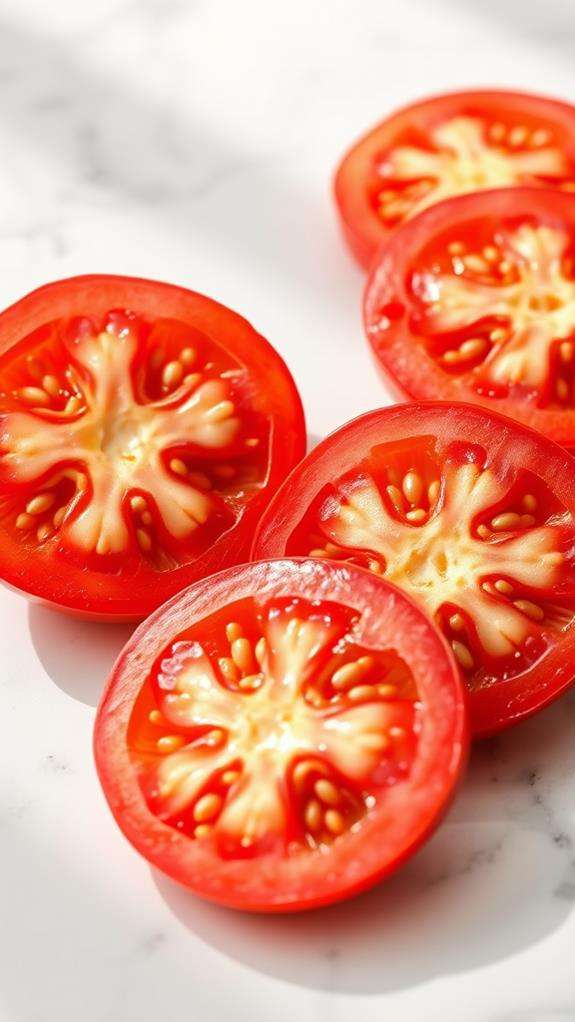Is It Safe to Eat Tomato Seeds
Tomato seeds are completely safe to eat and offer nutritional benefits. Contrary to popular myths, they're digestible and won't harm your digestive system. These tiny seeds contain fiber, healthy fats like omega-3s, and antioxidants such as lycopene. They're also a source of vitamins C and K, and minerals like potassium and magnesium. While some people might experience mild gastrointestinal discomfort due to increased fiber intake, this isn't harmful. You can safely consume tomato seeds as part of whole tomatoes or incorporate them into various dishes. If you're sensitive to lectins, you might want to remove the seeds, but for most people, they're a nutritious addition to your diet. Exploring further will reveal more about their culinary uses and health benefits.
This post may contain affiliate links. If you make a purchase through these links, I may earn a commission at no additional cost to you. Additionally, portions of this post may be generated using artificial intelligence (AI) technology. While we strive for accuracy, please be aware that AI-generated content may not always be perfect and should be fact-checked when necessary.
The Spatula Scoops
- Tomato seeds are safe to eat and completely digestible, providing fiber, nutrients, and antioxidants.
- Concerns about solanine toxicity in tomato seeds are unfounded, as ripe tomato seeds contain negligible amounts.
- Consuming tomato seeds may provide health benefits, including heart and brain support from omega-3 fatty acids.
- Passing intact seeds through the digestive system is normal and not indicative of harm or indigestibility.
- Tomato seeds contribute to the fruit's overall nutritional profile and can be incorporated into various culinary dishes.
Tomato Seed Anatomy

What exactly makes up a tomato seed? Let's explore the anatomy of these tiny structures you'll find nestled within your favorite salad ingredient. A tomato seed consists of three main parts: the seed coat, endosperm, and embryo. The seed coat, or testa, is the outermost layer that protects the inner components. It's usually smooth and slightly glossy, giving the seed its characteristic appearance. Much like raw corn on the cob, tomato seeds are safe to eat and can be consumed directly from the fruit without cooking.
Beneath the seed coat, you'll find the endosperm, a nutrient-rich tissue that surrounds and nourishes the embryo. This layer contains proteins, oils, and carbohydrates essential for the seed's initial growth. At the heart of the seed lies the embryo, which is the future tomato plant in miniature form. It comprises the radicle (embryonic root), hypocotyl (embryonic stem), and cotyledons (seed leaves).
When you bite into a tomato, you're consuming all these parts. The seed coat provides fiber, while the endosperm and embryo offer various nutrients. Understanding this anatomy helps explain why tomato seeds are generally safe and even beneficial to eat, contributing to the overall nutritional profile of the fruit.
Safety Concerns Debunked
You might've heard concerns about eating tomato seeds, but let's clear up some misconceptions. Contrary to popular belief, tomato seeds are completely digestible and won't cause any harm to your digestive system. While green tomatoes contain higher solanine levels, the seeds of ripe tomatoes are safe to consume. In fact, these tiny seeds pack a nutritional punch, containing beneficial compounds like fiber and antioxidants, which debunks the myth that they're nutritionally void or detrimental to your health.
Digestibility of Tomato Seeds
Although some people worry about eating tomato seeds, these concerns are largely unfounded. When it comes to digestibility, tomato seeds aren't as problematic as you might think. Your digestive system is well-equipped to handle these tiny seeds, which are primarily composed of fiber and protein.
The outer coating of tomato seeds is made of cellulose, a type of indigestible fiber. While you can't break down this fiber, it's not harmful and may even provide some benefits. It can aid in digestion by adding bulk to your stool and promoting regular bowel movements. The protein and oils inside the seeds are digestible, offering small amounts of nutrients.
You might notice tomato seeds passing through your system intact, but this doesn't mean they're causing harm. Your body will simply eliminate what it can't use. If you have specific digestive issues or sensitivities, you may want to remove the seeds, but for most people, there's no need to worry. Tomato seeds are a natural part of the fruit and won't interfere with your body's ability to absorb nutrients from the rest of the tomato.
Nutrient Content Myths
Misconceptions about the nutrient content of tomato seeds have led to unnecessary safety concerns. You might have heard that tomato seeds are toxic or nutritionally void, but these claims are unfounded. In reality, tomato seeds are not only safe to eat but also contain beneficial nutrients.
Contrary to popular belief, tomato seeds aren't a significant source of solanine, the compound some worry about. They do, however, contain healthy fats, including omega-3 fatty acids, which support heart and brain health. You'll also find fiber in tomato seeds, aiding digestion and promoting gut health.
Some claim that tomato seeds harbor anti-nutrients, substances that interfere with nutrient absorption. While seeds do contain small amounts of phytic acid, an anti-nutrient, the levels are negligible and don't pose a significant risk to your health or nutrient intake.
It's important to note that tomato seeds contribute to the fruit's overall nutritional profile. When you consume whole tomatoes, you're benefiting from a synergistic blend of nutrients found in both the flesh and seeds. So, there's no need to meticulously remove seeds from your tomatoes – they're safe and nutritious.
Nutritional Benefits

You'll be pleased to know that tomato seeds aren't just safe to eat; they're also packed with nutritional benefits. These tiny seeds contain essential vitamins and minerals, including vitamin C, potassium, and antioxidants, which can support your overall health. Much like corn's diverse uses, tomato seeds offer versatility in culinary applications and health benefits. Their nutrient profile is complementary to the tomato flesh, providing a well-rounded nutritional boost. Additionally, tomato seeds are an excellent source of dietary fiber, contributing to improved digestion and helping you feel fuller for longer periods.
Vitamins and Minerals
When it comes to nutritional benefits, tomato seeds pack a surprising punch. They're a rich source of vitamins and minerals that can contribute to your overall health. You'll find significant amounts of vitamin C in these tiny seeds, which supports your immune system and aids in collagen production. They also contain vitamin K, essential for blood clotting and bone health.
Tomato seeds are packed with minerals like potassium, magnesium, and phosphorus. Potassium helps regulate blood pressure and supports heart health, while magnesium is indispensable for muscle and nerve function. Phosphorus plays a pivotal role in bone formation and energy metabolism. You'll also find trace amounts of iron, zinc, and manganese in these seeds.
Interestingly, tomato seeds contain lycopene, a powerful antioxidant that gives tomatoes their red color. While the flesh of the tomato contains more lycopene, the seeds still contribute to your overall intake. This antioxidant has been linked to reduced risk of certain cancers and heart disease. By consuming tomato seeds, you're not only getting a nutrient boost but also potentially benefiting from their antioxidant properties.
Fiber Content
Tomato seeds are an excellent source of dietary fiber, contributing substantially to your daily intake. When you consume tomatoes with their seeds, you're boosting your fiber consumption, which is essential for maintaining a healthy digestive system. The fiber in tomato seeds is primarily insoluble, meaning it doesn't dissolve in water and helps add bulk to your stool, promoting regular bowel movements.
This insoluble fiber acts as a natural laxative, aiding in the prevention of constipation and reducing the risk of hemorrhoids. It's also beneficial for weight management, as fiber helps you feel fuller for longer periods. Additionally, the fiber in tomato seeds can assist in regulating blood sugar levels by slowing down the absorption of glucose in your intestines.
For those concerned about SEO, it's worth noting that including information about fiber content in your content can improve your page's ranking for health-related queries. When writing about tomato seeds' fiber content, use keywords like "dietary fiber," "digestive health," and "insoluble fiber" to enhance your article's visibility in search engine results pages (SERPs).
Potential Digestive Effects
Three main digestive effects may occur when consuming tomato seeds. First, you might experience a slight increase in your fiber intake. While the seeds aren't a significant source of fiber, they can contribute to your daily requirement, potentially aiding digestion and promoting regularity.
Secondly, you may notice undigested seeds in your stool. This isn't cause for alarm; it's simply because the outer coating of tomato seeds is tough and can pass through your digestive system intact. This phenomenon is known as "seed transit," and it's common with many small seeds.
Lastly, some people might experience mild gastrointestinal discomfort. If you're sensitive to lectins, compounds found in many plants including tomatoes, you could experience bloating or gas. However, this is relatively rare and usually only affects those with specific sensitivities.
It's worth noting that these effects are generally mild and shouldn't deter you from enjoying tomatoes. The seeds don't pose any significant health risks for most people. If you're concerned about potential digestive issues, you can always opt to remove the seeds before eating, though you'll miss out on their nutritional benefits.
Seed Removal Techniques

For those who prefer their tomatoes seedless, several effective techniques can help you remove the seeds. The most common method is to cut the tomato in half horizontally and gently squeeze out the seeds and gel-like pulp. You can also use a spoon to scoop out the seeds, which works well for firmer tomatoes. If you're dealing with a large quantity, consider using a food mill or tomato strainer, which will separate the seeds and skin from the flesh.
For a more precise approach, you can employ the blanching method. First, score an "X" on the bottom of each tomato, then briefly immerse them in boiling water. After about 30 seconds, transfer the tomatoes to an ice bath. The skin will easily peel off, allowing you to cut the tomatoes and remove the seeds more efficiently. This technique is particularly useful when preparing tomatoes for canning or making sauces.
Culinary Uses
When it comes to culinary applications, tomato seeds can bring a unique texture and subtle flavor to various dishes. You'll find that many chefs and home cooks incorporate these tiny seeds into their recipes for added depth and visual appeal. They're particularly useful in sauces, dressings, and salsas, where their slight crunch can provide an interesting contrast to smoother ingredients.
If you're making a tomato-based pasta sauce, you might consider leaving the seeds in for a more rustic texture. They'll break down slightly during cooking, releasing their flavors into the sauce. In raw preparations, like gazpacho or bruschetta, the seeds can contribute to the overall freshness of the dish.
For those interested in molecular gastronomy, tomato seeds can be isolated and used as a garnish or incorporated into foams and gels. Their high lycopene content also makes them a nutritious addition to smoothies and juices. When dehydrated, tomato seeds can be ground into a powder and used as a seasoning, adding a subtle umami flavor to various dishes. This technique is often employed in search engine optimization (SEO) for food blogs, as it creates unique content that can rank well in search results.
Myths and Misconceptions

Despite the culinary benefits of tomato seeds, several myths and misconceptions surround their consumption. You might have heard that tomato seeds are toxic or indigestible, but these claims are unfounded. In reality, tomato seeds are not only safe to eat but also nutritious.
One common myth is that tomato seeds contain solanine, a toxic compound found in some nightshade plants. However, tomato seeds don't contain solanine; it's primarily found in green parts of the plant. Another misconception is that tomato seeds can cause appendicitis. This belief stems from the idea that seeds can get stuck in the appendix, but there's no scientific evidence to support this claim.
Some people think tomato seeds are indigestible and have no nutritional value. In fact, they're a good source of fiber and contain beneficial compounds like lycopene, an antioxidant. You might also encounter the myth that removing seeds improves a tomato's flavor. While this can reduce bitterness in some varieties, it's not universally true and can actually remove some of the fruit's complex flavors.
Frequently Asked Questions
Can Tomato Seeds Be Used to Grow New Tomato Plants?
Yes, you can definitely use tomato seeds to grow new tomato plants. It's a cost-effective and rewarding way to start your garden. To do this, you'll need to extract seeds from ripe tomatoes, clean them, and dry them thoroughly. Once dry, you can plant them in seed-starting soil and provide proper care, including adequate light and water. With patience and attention, you'll soon see seedlings emerge, which you can then transplant into your garden when they're strong enough.
Do Different Tomato Varieties Have Different Seed Sizes or Flavors?
You'll find that tomato varieties do indeed have different seed sizes and flavors. While some cherry tomatoes have tiny, barely noticeable seeds, beefsteak varieties often boast larger, more prominent ones. As for taste, you might detect subtle differences. Some seeds are slightly bitter, while others are nearly flavorless. The seed's flavor can also be influenced by the tomato's overall taste profile. It's worth experimenting with different varieties to discover your preferences in both size and flavor.
Are There Any Cultural or Religious Restrictions on Consuming Tomato Seeds?
You'll find that there aren't widespread cultural or religious restrictions on consuming tomato seeds. Most major religions and cultures don't have specific rules about them. However, some individuals might avoid tomato seeds due to personal preferences or health concerns. For example, those following a low-fiber diet might limit their intake. It's always best to respect individual choices and be aware that while uncommon, some people might have personal or medical reasons for avoiding tomato seeds.
Can Tomato Seeds Be Dried and Stored for Later Consumption?
Did you know that tomato seeds can remain viable for up to 4 years when properly stored? Yes, you can dry and store tomato seeds for later consumption. To do this, you'll need to clean the seeds thoroughly, removing any pulp. Spread them on a paper towel and let them air dry for about a week. Once completely dry, store them in an airtight container in a cool, dark place. You can use these seeds for planting or add them to your meals as a nutritious snack.
Do Tomato Seeds Have Any Potential Uses in Skincare or Cosmetics?
While tomato seeds aren't commonly used in skincare or cosmetics, they do have potential applications. You'll find that these seeds contain lycopene, an antioxidant that may protect your skin from sun damage. They're also rich in vitamins C and E, which can help with skin elasticity and hydration. Some natural skincare brands incorporate tomato seed oil in their products, claiming it has anti-aging properties. However, more research is needed to fully understand their effectiveness in cosmetic formulations.
Conclusion
You've learned that tomato seeds are safe to eat and even offer nutritional benefits. Don't worry about removing them unless you're dealing with specific digestive issues. Next time you're slicing a tomato for your sandwich, remember that those tiny seeds are packed with fiber and antioxidants. Embrace them as part of your meal. If you're still concerned, try blending whole tomatoes into a smooth sauce, where the seeds become indistinguishable but still contribute their nutritional value.





